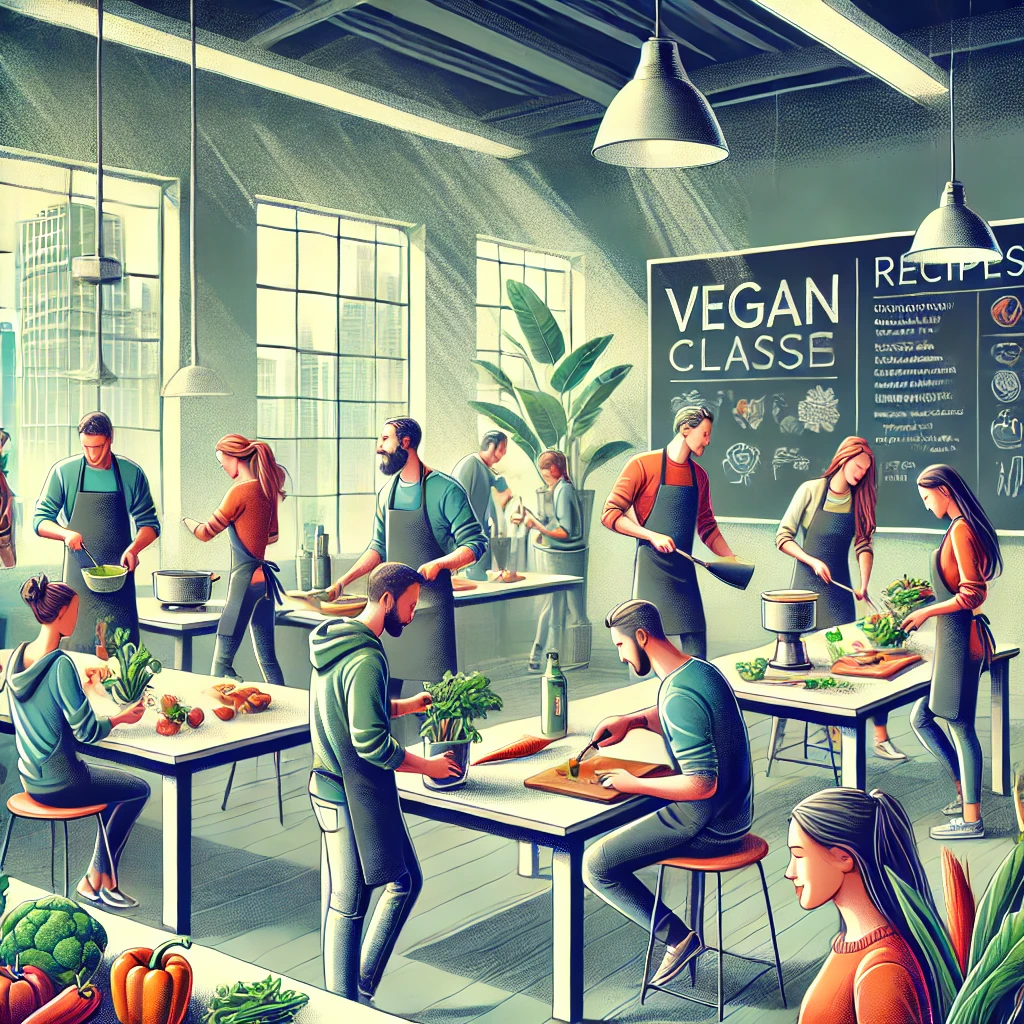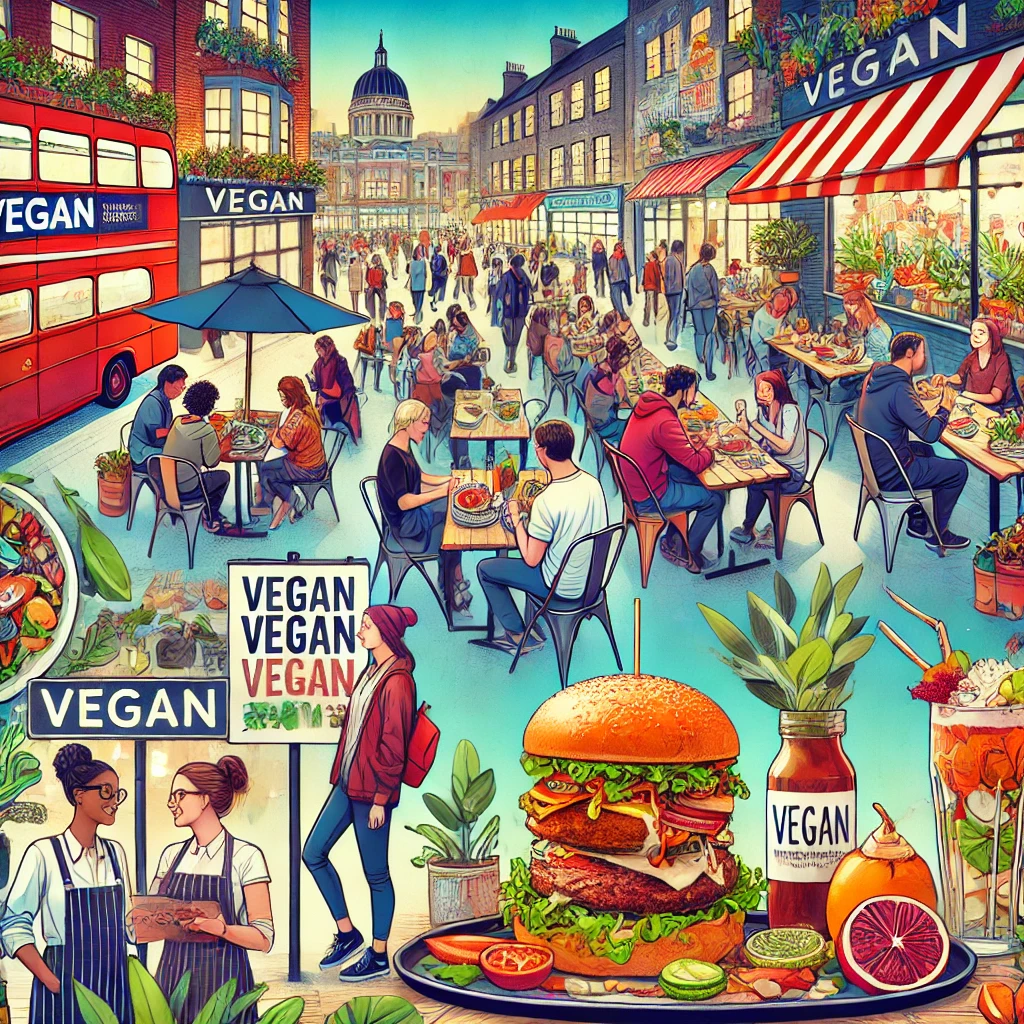Table of Contents

Introduction to the Vegan Movement
Veganism, a lifestyle choice that excludes all animal products and by-products, has grown significantly in recent years. Central to veganism’s core principles are the ethical, environmental, and health considerations that attract many to this way of living. Ethically, vegans oppose animal exploitation and slaughter for food, clothing, or other purposes. This conscientious stance aims to reduce animal suffering and promote animal rights.
From an environmental perspective, veganism addresses critical issues such as greenhouse gas emissions, deforestation, and water conservation. Plant-based diets are often lauded for their lower carbon footprint compared to diets reliant on animal agriculture, which is a significant contributor to global warming and environmental degradation. Additionally, reducing meat and dairy consumption can alleviate the pressure on natural resources, making veganism a sustainable choice for the planet.
Health is another compelling aspect for those adopting vegan diets. Numerous studies suggest that plant-based eating can reduce the risk of chronic illnesses, such as heart disease, diabetes, and certain cancers. A well-planned vegan diet, rich in fruits, vegetables, legumes, and whole grains, provides essential nutrients while minimizing the intake of unhealthy fats and cholesterol.
Historically, the roots of veganism date back to ancient civilizations, but it formally gained recognition in the mid-20th century. The term “vegan” was coined in 1944 by Donald Watson, co-founder of the Vegan Society in the UK. What began as a niche movement has gradually evolved, gaining mainstream acceptance and changing the food landscape. In the UK, the past decade has witnessed a dramatic rise in veganism, driven by increased awareness and accessibility of vegan products.
Today’s vegan movement is a dynamic and inclusive community, encompassing diverse perspectives and motivations. Its growth is reflected in the proliferation of vegan restaurants, food festivals, and plant-based options in supermarkets and dining menus across the UK. This burgeoning interest underscores a societal shift towards more conscious and compassionate dietary choices.
Statistics on Veganism in the UK
Recent statistics reflect a significant rise in veganism across the United Kingdom, underpinned by various contributing factors. According to a 2021 survey conducted by the Vegan Society, there are now approximately 600,000 vegans in the UK, which is a substantial increase from 150,000 in 2006. This represents a fourfold growth in just 15 years. Furthermore, this data is corroborated by a 2019 market analysis conducted by Kantar, which indicates that around 1.2% of the UK population adhere strictly to a vegan diet.
Demographically, the trend towards veganism is most prominent among younger populations. Studies reveal that individuals aged 15-34 are significantly more likely to adopt a vegan lifestyle compared to older age groups. This demographic accounted for nearly 42% of the vegan population in the UK in 2020, influenced by factors such as environmental consciousness and ethical considerations regarding animal welfare. Additionally, gender differences have been observed, with women being more likely to follow a vegan diet than men.
Market analyses further reveal the growing appeal of veganism beyond strict dietary constraints. According to a report by Mintel, 25% of all new food product launches in the UK in 2020 carried a vegan claim. This is a marked increase from just 17% in 2018, reflecting the rapid adaptation by the food industry to meet consumer demands. These vegan products span a range of categories, from meat substitutes to dairy-free alternatives, indicating a broad acceptance and integration of plant-based options in mainstream diets.
The rate of new adopters of veganism continues to rise, driven by comprehensive awareness campaigns, prominent endorsements from celebrities, and increased media coverage on the benefits of plant-based eating. This positive trajectory is expected to persist, signaling profound shifts in dietary preferences and food consumption patterns within the UK.
Impact on the UK Food Industry
The rise of veganism in the UK has brought transformative changes to the food industry, permeating various segments from restaurants to retail. As plant-based eating gains traction, it has significantly altered menu offerings, with restaurants increasingly incorporating vegan options to accommodate this dietary shift. Many mainstream eateries, including popular chains like Wagamama, Pizza Express, and Nando’s, have introduced dedicated vegan menus or expanded their plant-based selections, reflecting the burgeoning demand.
The surge in vegan-friendly cafes underscores this trend, with establishments such as LEON and Pret A Manger leading the way. These cafes offer an array of vegan dishes, from hearty meals to delectable desserts, appealing not just to vegans but to a broader audience seeking healthier and more sustainable dining choices. This movement is not confined to independent cafes; high street brands have swiftly adapted to cater to the increasing population opting for a plant-based lifestyle.
Supermarkets have also played a pivotal role in supporting the rise of veganism. Major retail chains like Tesco, Sainsbury’s, and Marks & Spencer have significantly expanded their range of plant-based products. These supermarkets now stock an extensive variety of vegan options, from meat substitutes to dairy-free alternatives, making it easier for consumers to integrate veganism into their daily lives. The introduction of branded vegan lines, such as Tesco’s ‘Plant Chef’ and Sainsbury’s ‘Plant Pioneers,’ further exemplifies the commitment of these retailers to meeting the growing demand.
Moreover, well-known brands have diversified their offerings to include vegan alternatives. Companies like Greggs have achieved notable success with products such as the vegan sausage roll, demonstrating that plant-based items can be both popular and commercially viable. Such initiatives indicate a broader acceptance and normalization of vegan options within the mainstream food industry, showcasing a significant shift towards inclusivity and sustainability in response to evolving consumer preferences.
Innovations in Vegan Food Products
The vegan food market has seen substantial advancements in recent years, particularly within the United Kingdom. The shift towards plant-based diets is increasingly complemented by innovative vegan food products designed to meet consumer demands for both taste and nutritional value. A major driver of this change has been the remarkable development of plant-based meat substitutes. These alternatives, which use ingredients such as pea protein, soy, and mycoprotein, have succeeded in replicating the taste and texture of traditional meats, securing widespread acceptance among both vegans and non-vegans alike.
Dairy alternatives have also made significant strides, with products like almond milk, oat milk, and soy-based yogurts becoming commonplace in supermarkets. Leading UK-based companies such as Alpro, Oatly, and The Coconut Collaborative have led the charge by constantly refining their products for better taste and nutritional profiles. These companies have not only carved out a significant market share but have also driven larger dairy corporations to expand their offerings to include vegan options.
Additionally, the realm of processed and packaged vegan foods has witnessed notable innovations. Brands such as Vivera, The Meatless Farm Co, and Quorn are pioneers in creating new culinary experiences that mimic traditional dishes without compromising on vegan principles. Such products include vegan sausages, burgers, and even ready-to-eat meals that address the convenience needs of the modern consumer.
Consumer satisfaction and acceptance of these products have been largely positive, reflecting a broadening palette and openness towards veganism. Surveys indicate not only increased sales but also high levels of customer loyalty and positive feedback. The advances in vegan food innovations have undeniably played a crucial role in normalizing plant-based eating, making it accessible and desirable to a wider audience.
Health Benefits and Concerns
A vegan diet, characterized by the exclusion of all animal products, has garnered significant attention for its numerous health benefits. Research suggests that plant-based eating can play a pivotal role in reducing the risk of chronic diseases. For instance, several studies have highlighted that vegans tend to have lower blood pressure and cholesterol levels, which can lead to a reduced risk of heart disease. Furthermore, a diet rich in fruits, vegetables, legumes, and whole grains is associated with better weight management. This is largely attributed to the high fiber content in these foods, which promotes a feeling of fullness and aids in digestion.
However, while the health benefits of a vegan diet are compelling, it is equally important to address potential nutritional concerns. One of the primary issues is ensuring adequate intake of essential nutrients that are more readily available in animal products. Key nutrients of concern include vitamin B12, iron, calcium, and omega-3 fatty acids. Vitamin B12, for example, is crucial for nerve function and the production of red blood cells but is naturally found almost exclusively in animal products. Vegans are advised to seek fortified foods or supplements to meet their B12 requirements.
Iron, another critical nutrient, is present in plant-based foods but in a form that is less easily absorbed by the body compared to iron from meat. To enhance iron absorption, combining iron-rich plant foods with vitamin C-rich foods, such as citrus fruits or bell peppers, can be beneficial. Calcium, essential for bone health, can be sourced from fortified plant milks, tofu, and leafy greens, while omega-3 fatty acids can be obtained from flaxseeds, chia seeds, and walnuts.
Expert opinions from nutritionists and dietitians underscore the importance of a well-planned vegan diet. Dietitian Emma Thornton emphasizes, “While a vegan diet can be incredibly healthful, it requires careful planning and mindful eating to ensure all nutritional needs are met.” Consulting with a healthcare professional or a registered dietitian can provide personalized guidance to maintain balanced nutrition, making the transition to a vegan lifestyle both healthful and sustainable.
Environmental and Ethical Impacts
The rise of veganism in the UK has been significantly influenced by its notable environmental benefits. Adopting a vegan diet can meaningfully reduce one’s carbon footprint, as plant-based foods generally require fewer resources to produce compared to animal products. Agriculture for livestock is a major contributor to greenhouse gas emissions; however, growing grains, vegetables, and fruits results in lower emissions and a lesser impact on global warming. Consequently, as more individuals switch to veganism, the overall carbon footprint associated with food production diminishes.
Water usage is another critical factor where a plant-based diet shows considerable advantages. Livestock farming is notoriously water-intensive, necessitating vast quantities for both animal hydration and feed crop irrigation. In contrast, plant cultivation for direct human consumption demands significantly less water, thereby alleviating some of the pressures on global freshwater supplies. The cumulative effect of reduced water usage through widespread veganism contributes to more sustainable management of this vital resource.
Deforestation is also closely linked to meat production, as extensive land is cleared for grazing and growing animal feed crops. This process not only leads to habitat destruction and biodiversity loss but also exacerbates climate change by releasing stored carbon dioxide into the atmosphere. By opting for a vegan diet, individuals help to lessen the demand for such land-clearing activities, promoting the preservation of forests and their crucial ecological roles.
Ethically, the shift towards veganism addresses profound concerns regarding animal welfare. Industrial farming often subjects animals to inhumane conditions, ranging from overcrowded living spaces to unnatural feeding practices. Advocates of veganism emphasize the importance of moving towards more humane farming practices, where the exploitation of animals is minimized. By choosing plant-based options, consumers can support a food system that prioritizes the dignity and well-being of animals, aligning with broader ethical values of compassion and nonviolence.
Challenges and Criticism of Veganism
Transitioning to a vegan lifestyle in the UK presents a number of challenges, making the shift from traditional eating habits to plant-based alternatives demanding for many individuals. One of the principal barriers is accessibility. For those living in rural areas, finding a variety of vegan-friendly products may be difficult, as options tend to be more readily available in urban centers. Furthermore, the convenience of plant-based meals often falls short when compared to non-vegan fast foods, which are widely accessible.
Cost is another significant factor. While staples like beans, lentils, and rice are generally affordable, specialized vegan products, such as dairy-free cheese or meat substitutes, can be more expensive. This can discourage potential adopters who may be working within a limited budget. Additionally, some critics argue that a vegan diet is nutritionally inadequate, citing concerns over deficiencies in essential nutrients like B12, iron, and omega-3 fatty acids. However, these nutritional gaps can be addressed with careful meal planning and appropriate supplementation.
Social acceptance remains a hurdle for many transitioning to veganism. The shift often brings about changes that challenge long-standing cultural and familial traditions centered around meat and dairy. Social gatherings and dining out can become complicated, with limited vegan options on many restaurant menus. This can lead to feelings of exclusion or being perceived as difficult or overly choosy.
Common criticisms and misconceptions about veganism also play a role in hesitations and objections. Critics often claim that veganism is an extremist lifestyle choice or a fad. However, evidence increasingly supports the health and environmental benefits of plant-based eating. Arguments of personal freedom and tradition are often used to oppose veganism, yet the growing availability of diverse and delicious plant-based foods, along with increased awareness of the ethical and ecological implications of meat consumption, provide strong counterpoints.
Ultimately, while there are undeniable challenges and criticism associated with adopting a vegan lifestyle, increasing access to varied and affordable plant-based foods, coupled with greater societal acceptance and informed nutritional advice, can help mitigate these obstacles.
The Future of Veganism in the UK
The future of veganism in the UK appears poised for significant growth, propelled by various factors including emerging research, progressive public policies, and evolving societal attitudes. As awareness of environmental sustainability and animal welfare continues to rise, more individuals are likely to adopt plant-based diets, further mainstreaming veganism.
Continuous advancements in vegan food technology are set to play a vital role in this evolution. Research and development are pushing the boundaries of plant-based alternatives, with innovations in texture, taste, and nutritional value. Companies are investing heavily in creating products that not only mimic the sensory experiences of animal-based foods but also offer superior health benefits. The introduction of lab-grown meats and high-quality meat substitutes, such as mycoprotein and pea protein, is already reshaping consumer preferences, making it easier for people to transition to a vegan lifestyle.
Public policies will be instrumental in fostering a supportive environment for veganism. Government initiatives that fund sustainable food projects, enforce stricter regulations on food labeling, and incentivize plant-based food production can drive widespread adoption. Educational campaigns focusing on the environmental and health benefits of a vegan diet could further promote public uptake, making plant-based eating more accessible and attractive to a broader demographic.
Societal shifts are also likely to bolster the growth of veganism. Younger generations, particularly millennials and Gen Z, are demonstrating higher rates of veganism, influenced by social media and a growing consciousness towards sustainability and ethics. As these generations take on more prominent roles in society, their values will inevitably shape food choices and industry standards. Restaurants and supermarkets are recognizing this trend, expanding vegan options to cater to increased demand.
Ultimately, the trajectory of veganism in the UK points towards a future where plant-based eating becomes increasingly normalized. The combination of technological, policy-driven, and societal drivers ensures that veganism will continue to influence and redefine the UK food landscape in profound ways.






